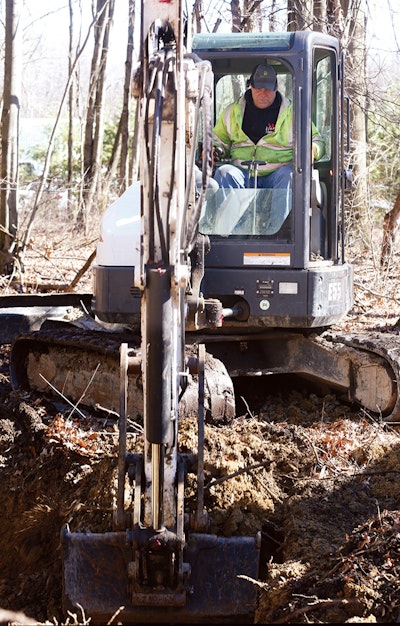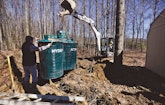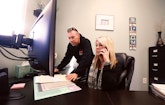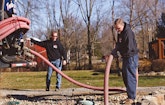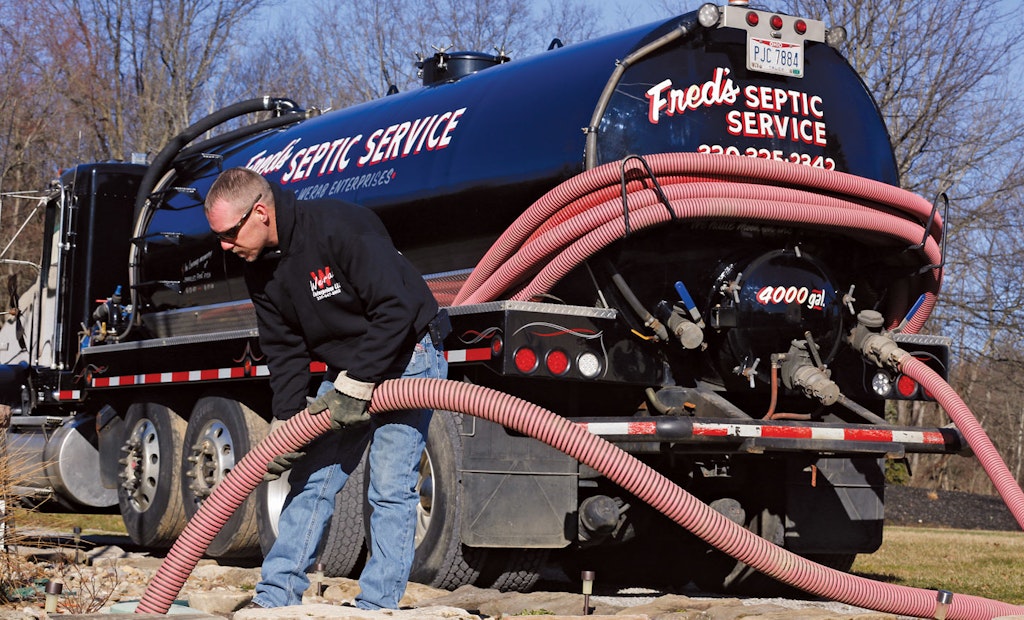
Running in a Fred’s Septic Service rig, built out by Marengo Fabricated Steel and using a Fruitland pump, Chad Werab cleans a residential septic tank. (Photos by Amy Voight)
Chad Werab’s excavating and truck-related businesses kept him plenty busy before he purchased Fred’s Septic Service in 2008. Adding the pumping service was a practical option at the time to improve efficiency for other services he provides. Now it’s blossomed into an integral part of the Werab Enterprises’ menu of services to customers in northeastern Ohio. The variety also provides opportunities for him to make the most of his fleet of trucks and equipment.
“We try to make everything versatile so if one business is slow, we have the other businesses’ revenue, and we can stay busy,” Werab says.
MECHANIC TO ENTREPRENEUR
At 38, Werab has already been a business owner for 15 years, but he didn’t jump into self-employment without a safety net. He started out with diesel mechanic training and helped manage a limestone yard. When the yard announced it would close the following year, Werab used the opportunity to continue working part time while starting his earth-moving business.
In 2003, he purchased an excavator and skid loader and partnered with his father, Paul Werab, who worked for the county during the day and with his son during off-time. A couple of years later, Chad Werab was on his own when his father passed away from cancer.
By 2006, Werab had hired two employees who helped him install septic systems in addition to other excavating work. They also provided snowplowing, landscaping and lawn maintenance to stay busy during the economic downturn. In 2008, when Werab’s township installed a sewer system, he contracted to hook up the majority of 75 systems. Part of the job was to pump out the old septic tanks so they could be crushed and abandoned.
“Every day I had to pump a tank, and when I needed a pumper, they couldn’t get there for a day or two,” Werab recalls. “I knew Fred Fish, and he said, ‘Why don’t you just buy my business?’”
Werab did just that; he bought Fish’s pumping business and hired Fish to pump full time.
“I hit the lottery. I bought the business (Fred’s Septic Service) with the guy who has the knowledge,” Werab recalls. Besides Fish, his new business came with a 1979 Autocar vacuum truck and a client list with about 8,000 names.
ON-THE-JOB EDUCATION
Fish’s experience didn’t go to waste. Werab let his eight-man crew handle construction excavation work, while he pumped tanks with Fish for a year. Werab sold the Autocar and purchased two tandem Mack trucks (1993 and 2003), so they could start off with newer equipment. Fish worked for Werab Enterprises for four years, before he retired. He passed away in September 2014.
There were lean years for the pumping side of the business during that time, so Werab adjusted.
“We had three trucks, but pumping was down so we turned two trucks into dump trucks,” he explains. “Now that (pumping) is picking up, we are buying more.”
Werab Enterprises’ customer list has grown to 10,000, mostly residential. There are plenty of competitors, but some have gone out of business because of increased regulations.
“Ohio requires paperwork for inspecting and land application on a weekly basis,” Werab says. “There’s a tremendous amount of paperwork and recordkeeping. One county wants a pump report. The state code requires an inspection sheet that is a pump report.”
About 25 percent of the septage is land-applied with a floater truck and spread with lime to change the pH to 12 — a common practice in Ohio. The rest goes to the Alliance Wastewater Treatment Plant, which dewaters the sludge for disposal.
Prior to purchasing Fred’s Septic Service, Werab had installed systems, but business slowed between 2008-10. Installations picked up after that when he started working with Wastewater Solutions in Alliance, Ohio, a dealer for Hydro-Action advanced systems he needs for conventional and mound systems, aerators and spray irrigation, and drip irrigation systems commonly installed in the state.
EQUIPMENT VERSATILITY
Werab has the ability to haul sludge and install systems because of equipment choices that fit the needs of all the excavating/trucking services he offers. The pumping service utilizes three semis. A 2009 Kenworth T800 quad-axle vacuum tanker has a 4,000-gallon steel tank and was built by Marengo Fabricated Steel. A 6,000-gallon steel tanker trailer built by Dragon Products can be pulled with Werab’s 2014 Kenworth T800 semi or a 1997 Freightliner. The tanks have Fruitland 500 cfm pumps.
“There is a pressure washer and (General Pipe Cleaners) jetter in every truck with freshwater, and they have heated valves (for winter),” Werab says. They also have Viztrac sewer cameras with locators (Amazing Machinery).
Werab Enterprises has four trucks for hauling system installing supplies: a 2003 Mack Granite quad-axle dump, a 1995 Ford L8000 single-axle dump, a 1994 International 9400 tandem-axle dump, and a 1994 Mack tandem-axle dump (from Heil Trailer International, Bibeau, and East Mfg.).
For digging, employees have access to a Bobcat E55 mini-excavator, two John Deere excavators, a John Deere dozer and John Deere track loader, and three Bobcat skid loaders. The laser-equipped excavators make it easier to install septic components and grade drainfields and waterways.
With the purchase of a container business in 2016, now called Werab Container, he acquired two hook-lift trucks — a 1994 Chevrolet Kodiak and a 2002 International 9400 with SwapLoader USA lifts.
“We’ve ordered a new tank (2,000-gallon, steel) from Marengo Fabricated Steel that we can use with our hook-lift truck,” he says. “It will be a stand-alone that we can unhook, and my guys can vac or jet a system out.”
Werab also owns miscellaneous trucks and equipment for snow removal and spreading salt during the winter.
OFFICE AND REGULATION CHALLENGES
Werab Enterprises employees are as versatile as the equipment they use. Most are cross-trained to work in all areas. Typically, two full-time employees handle septic service. Another three employees handle onsite installation and system repairs. All go through refresher safety training classes a couple times a year and some attend continuing education courses. All employees receive a paid vacation between New Year’s and Christmas.
Werab is the main mechanic with help from an employee. They work in a heated four-bay shop in a 40-by-80-foot building that includes an office. A new 50-by-60-foot shop was recently built to house trucks and equipment.
Werab’s fiancee, Paula White, recently quit her nursing job to run the office. One of her main tasks is to find an effective software program and update customer information. She uses QuickBooks for accounting.
“We have coupons for pumping and do a little phone book advertising,” Werab says.
White also updated Fred’s Septic Service website, which is separate from Werab Enterprises’ website. Fish’s red trucks from the old business are now all black with a big red W to match the Werab Enterprises equipment. The consistency capitalizes on free advertising for the company’s many varied services.
“Every one of our businesses helps advertise the other ones,” Werab notes.
ADJUSTING SERVICES
“Everything is moderately busy,” Werab says. “Housing is picking up so we have new installs. We do drainage for agriculture. We also have two semis with flatbeds hauling every day.”
With the purchase of the container business, Werab has added another service to give the company even more versatility. He plans to maximize the hook-lift trucks to increase efficiency for many of his services.
The pumping/installation business complements the excavating business. The five to 10 basements Werab digs for new construction each year typically also include septic system installation and potential customers for pumping in the future. All that adds up to keeping employees busy and the company prospering because of its diversity.
“We are happy where we are at,” Werab concludes.
Remembering his mentors
Chad Werab may be the sole investor and owner of Werab Enterprises, but he is savvy enough to listen to others to learn about running a business and the day-to-day challenges. Though his two mentors have died, he’ll never forget how they helped him as an entrepreneur.
“My dad (Paul Werab) was a manager, and he knew the right things to say to people,” Werab says. Paul Werab took care of the paperwork and financing using Chad Werab’s investment while the younger Werab learned the ins and outs of the septic pumping business.
Both enjoyed working as partners, and Werab learned from his dad’s knowledge and social skills.
Werab’s second mentor, Fred Fish, sold him the pumping business.
“He just taught me the whole business,” Werab recalls. “He helped me manage.”
While he offered advice, Fish easily fell into the role of employee and never tried to be “the boss.”
“He liked it. He had newer trucks to run. He had no worries; it was all on me,” Werab says.
For his part, Werab says he listened to advice from both his father and Fish and followed what they taught him. He greatly respected them and appreciates their lessons and help, which he continues to follow.
